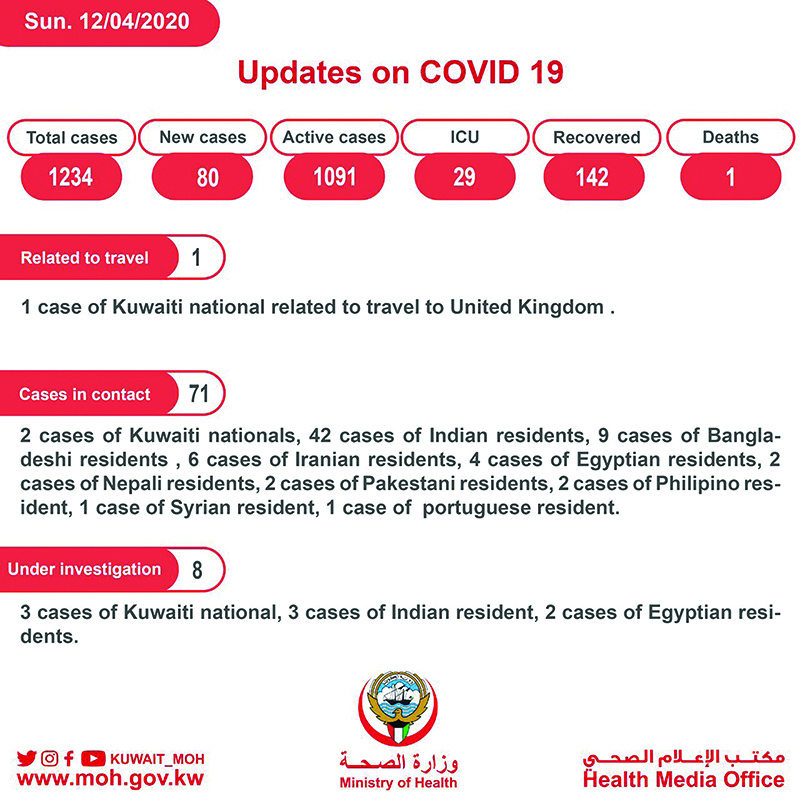
By B Izzak
KUWAIT: The government said yesterday it is ready and prepared for imposing a total curfew in the country, but reiterated that no decision has been taken yet. Interior Minister Anas Al-Saleh said that total curfew remains an option for the health authorities based on public interest and the protection of the health system in the country. The minister however said security agencies are ready and prepared to impose the curfew as soon as the decision is issued. Saleh made the remarks as he inspected Jleeb Al-Shuyoukh, which is under a lockdown, and a number of shelters and quarantines for expat workers.
The ministry of health yesterday reported 80 new coronavirus cases, raising the total number to 1,234, of whom 142 cases have recovered and one died. Of the new cases, 45 are Indians, raising their number close to 700, in addition to nine Bangladeshis, six Kuwaitis, six Egyptians and six Iranians, while the remaining are of various other nationalities.
Government spokesman Tareq Al-Mazrem said no decision has been taken to impose a total curfew, and all government agencies have been making preparations, arrangements and plans in case the total curfew decision is taken. He added that what is being circulated about a total curfew in untrue and baseless. Local and social media have been rife with expectations that the government is on the brink of imposing a total curfew in the face of a steep rise in the number of coronavirus cases, which on Saturday jumped to 161 cases, the largest single-day toll so far.
As the government placed Jleeb Al-Shuyoukh and Mahboula under lockdown, where more than half a million expat workers live, authorities have stepped up their fight against visa traders. The public prosecutor has ordered the detention of a Kuwaiti officer along with his six Egyptian partners and charged them of trafficking in persons and selling residence permits for money.
The main suspect is a colonel in the interior ministry, who was sacked last week by the interior minister. He is accused of bringing some 1,300 Egyptian workers for amounts reaching up to KD 2,000 per person and leaving them without jobs. His company also used to also charge several hundred dinars for annual renewal of residencies.
MPs have also pressed the government to repatriate thousands of Kuwaitis stranded overseas. The lawmakers want the repatriation to happen before the start of the holy month of Ramadan on April 24. Reports said the government will operate within days an air bridge to bring back more than 10,000 citizens from several countries, and most of them will pledge to stay in home quarantine as there is no space to keep them in health ministry quarantines.
Meanwhile, Saudi Arabia's King Salman extended a nationwide curfew until further notice due to the spread of the new coronavirus, the interior ministry said yesterday, after the kingdom reported more than 300 new infections on each of the last four days. Last week Saudi Arabia placed its capital Riyadh and other big cities under a 24-hour curfew, locking down much of the population to stem the spread of the virus. Elsewhere, the curfew which began on March 23 runs from 3 pm to 6 am.
The country of some 30 million has recorded 4,033 infections with 52 deaths, the highest among the six Gulf Arab states where the total count has surpassed 13,200 with 88 deaths despite strict measures to curb transmissions. The kingdom has halted international flights, suspended the year-round umrah pilgrimage, and closed most public places. Other Gulf states have taken similar precautions.
The interior ministry said all precautionary measures across Saudi Arabia's 13 regions remain in place. The eastern Qatif region, where its first coronavirus cases were reported among Shiite pilgrims returning from Iran, has been sealed off since March 8. The United Arab Emirates, the region's tourism and business hub, has the second highest tally at 3,736 cases with 20 deaths.
Several Gulf Arab states have seen the virus spread among low-wage foreign workers, many of whom live in overcrowded accommodations. Qatar has locked down a large section of an industrial area, Dubai has sealed off two commercial districts with a large population of migrant workers, and Oman has closed off its Muscat governorate, which includes the capital. Millions of migrant workers, mainly from Asian countries, including Nepal, India and the Philippines, are among the region's large expatriate population.
India's ambassador to the UAE told local English-language daily Gulf News on Saturday that the Indian government cannot repatriate a large number of its nationals while trying to break the chain of infection at home. "At this stage, we feel that it is best for them (Indians wishing to return home) to stay where they are," Pavan Kapoor was quoted as saying. "Once the lockdown in India is lifted, we will certainly help them get back to their home towns and their families."










